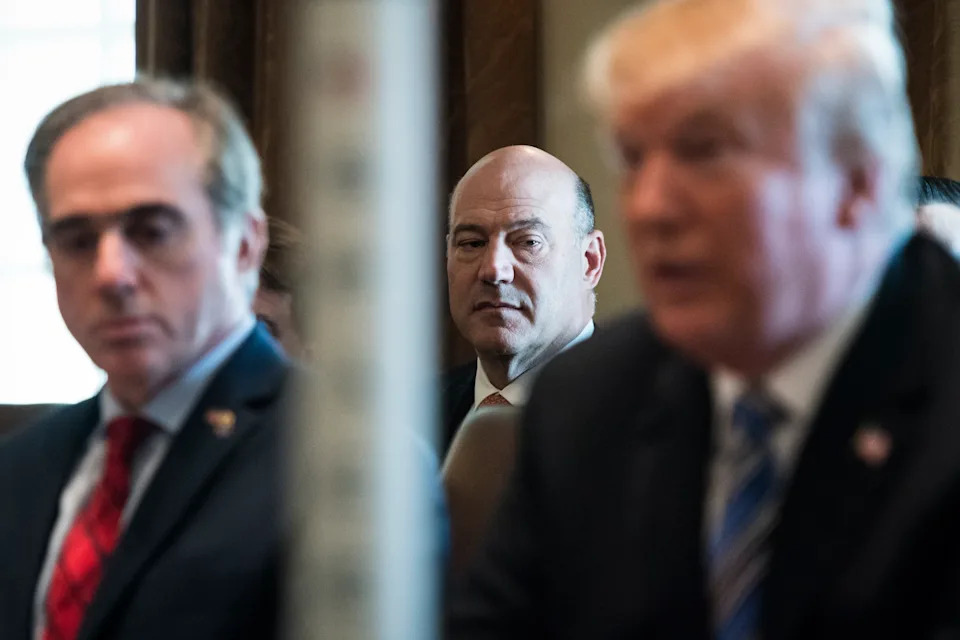News
Stock market needs less policy ambiguity, former Trump economic adviser Gary Cohn says
Listen and subscribe to Opening Bid on Apple Podcasts , Spotify , Amazon Music , YouTube , or wherever you find your favorite podcasts.
Whipsawing markets could use a dose of policy certainty.
"I would tell anyone who wants to understand what's going on in markets ... that markets thrive on predictability and they thrive on uncertainty," former director of the National Economic Council and current IBM vice chair Gary Cohn said on Yahoo Finance's Opening Bid podcast (video above).
"Ambiguity is the No. 1 enemy of a market," Cohn continued. "When a company creates ambiguity in their earnings profile, in their growth profile, in their business model, the market will punish that stock. When politicians, legislators create ambiguity in the way that taxes are going to work, the way that capital gains are going to work, the way that they're going impose tariffs, they create ambiguity to a market and the market as a whole reprices."
Cohn — Trump's top economic adviser during his first term — wouldn't go as far as to say tariffs would trigger a growth slowdown as a consequence of inflation. But he is hopeful stability eventually comes to the policy matter that has been anything but stable this year.
Read more: What Trump's tariffs mean for the economy and your wallet

"We could end up in a position where the administration settles down on what they want to do with tariffs," Cohn added. "They get tax policy through Congress. They get the budget through Congress. We understand what we're doing from a financial standpoint. We understand what they need tariffs for or they don't need tariffs for. And they settle on a methodology, and we get into a very stable position."
Markets are hanging on every development of the tariff front , which may be about to come to a head.
Trump has pledged to unveil new tariffs on April 2, coining the date "Liberation Day." It's unclear what the new tariff rates will be and who they will apply to. But the president on Monday vowed "substantial tariffs" on US trading partners.
Goldman Sachs chief economist Jan Hatzius said on Monday he sees two reasons why April 2 is setting up to negatively surprise markets .
"First, administration officials have said explicitly that the soon-to-be-announced tariff rates are intended as the basis for negotiation, which incentivizes the administration to propose higher rates at the outset," Hatzius explained. "This occurred in the recent experience with Canada and Mexico tariffs, which twice involved a steep tariff rate that was rescinded mostly or entirely after a few days."
"Second," he added, "our recent survey shows market participants who believe reciprocal tariffs are likely expect a 9 percentage point reciprocal tariff rate on average. We expect the initially proposed rate to be higher than the survey result, potentially closer to double what market participants expect."
Trump has already implemented a second round of 10% duties on Chinese imports after instituting 10% in February.
Read more: The latest news and updates on Trump's tariffs
The targeted countries wasted no time hitting back.
China unveiled a 15% tariff on US chicken, wheat, corn, and cotton products and an additional 10% tariff on sorghum, soybeans, pork, beef, seafood, fruits, vegetables, and dairy products.
Canada announced a 25% tariff on 30 billion Canadian dollars of US imports.
The full Opening Bid episode with Gary Cohn will air on Wednesday at 8:30 a.m. ET. You can watch on Yahoo Finance's Streaming Now hub and all major streaming platforms.
Three times each week, I field insight-filled conversations and chats with the biggest names in business and markets on Opening Bid . You can find more episodes on our video hub or watch on your preferred streaming service .
Brian Sozzi is Yahoo Finance's Executive Editor. Follow Sozzi on X @BrianSozzi , Instagram , and LinkedIn

